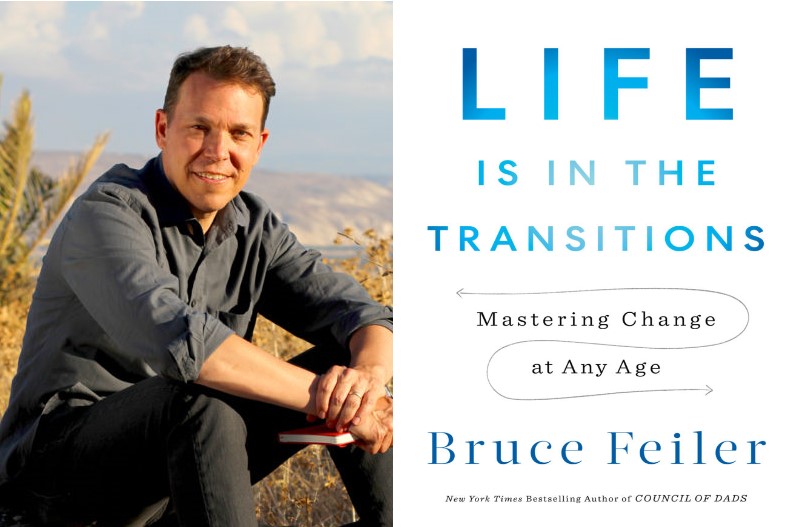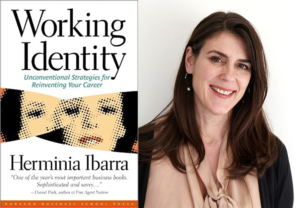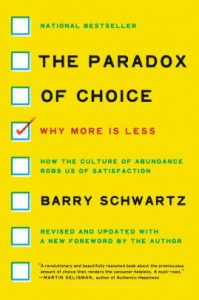Article Summary:
How to know if we’re on the wrong career path—or the wrong path in life? Is there a right path? How to decide and move forward?
+++
Sometimes in life we may wonder if we’re on the wrong path. Things can feel off. We may wonder if we’re pursuing a path that doesn’t align with who we are and our core values and aspirations. We can wonder if the path we’re on is taking us somewhere we want to go.
At the end of all our hard work, all our pursuit, what’s the destination we’re headed to? Is it a worthy one? Is it good and true? Does it represent our true nature, resonate with something deep inside us, and honor the life we’ve been given?
“What is the use of running when we are not on the right road?”
-German proverb
Are There “Right” Paths and “Wrong” Paths?
This notion of a “path,” of course, is a metaphor that represents our current direction—in work and in our life more broadly. Evaluating our path naturally raises questions about whether our path is right or wrong. Is that an accurate and helpful way to think about it?
Yes and no.
When we talk about a “right path,” we mean one that aligns with who we are and our core values and aspirations—one that’s taking us somewhere we believe to be good and worthy of our efforts. A “wrong path” doesn’t do those things.
In that sense, there are right and wrong paths. But in reality, things aren’t often so clear and binary.
There are no perfect paths, and there isn’t only one good or right path for us.
Also, we’re not bad, stupid, or behind if we haven’t figured out our path yet—or if we discover we may want to change course.
Life can be challenging, messy, and unclear. We may have changed as a person, causing us to want to head in new directions. And that’s okay.
What’s more, we’re all different. Some people want career advancement. Others want entrepreneurial venturing or creativity. Still others want flexibility and freedom, while some want balance or stability.
There’s a place in life for adventure. For wandering off the path and exploring.
We don’t always have choices about our work. Sometimes there are real constraints and barriers, so we have to keep our heads down and work in what’s available to support ourselves and our families. (We must also be honest and not conflate rationalizations with real needs.)
Here’s the key: it’s critical to stop walking sometimes and take a look around to see where we are and where we’re headed. Is our direction still a good and worthy one or is it time to change? The key is to be clear and intentional in choosing—and then brave and committed in moving forward.
Signs We’re on the Wrong Path
Making a good assessment of the path we’re on can be difficult because we can be on autopilot and not even mindful of the path we’re on. (See the article, “Are You Sleepwalking through Life?”)
Sometimes our view is obstructed by the trees and branches around us, making it hard to see the big picture. And sometimes we’ve been walking a long way while looking only at the ground in front of us without gauging our location and direction. Do we still want to get to where we’re going?
Sometimes we’re reluctant to assess things because we sense that we’re not going to like the result.
“I had fallen into a life that was not what I wanted, and I couldn’t see any way to escape from it without tossing a live grenade into the carefully constructed world I had built…. Maybe I didn’t need to be defined by my achievements and how fast I could get there, but instead by what brought me joy and happiness and inspired my passions.”
-Alisha Fernandez Miranda, My What-If Year: A Memoir
How to know how we’re doing? Here are ten signs that we may be on the wrong path:
- Not liking our work or not feeling engaged and energized by it
- Regularly wishing we were doing something different and dreaming about working in other fields
- Longing to go back and make different decisions
- Missing fun and joy in our work
- Feeling that our work no longer has relevance, meaning, or significance
- Lacking enthusiasm and motivation for our current path and what we’re doing
- Living the success script of others
- Feeling our life is passing us by
- Feeling like we’re living someone else’s life—chasing the goals and dreams of others
- Envying people who have summoned the courage to travel their own authentic path (or “LIFE entrepreneurs”)
How We Got There
It’s common for people to find themselves on a wrong path—or to question the direction they’re headed. Life tends to have its twists and turns.
Here are some of the things that can get us off track:
Childhood programming. Some parents steer us heavily toward certain paths of their own preference. They may be trying to live vicariously through their children or viewing their children’s choices as a reflection of their own worth.
“…make no mistake about it, well-meaning people around you—friends, family, work associates, and others—
will push you to run someone else’s race.”
-Dr. Nicholas Pearce, professor, Northwestern University Kellogg School of Management
People-pleasing. Maybe we put others’ needs or preferences ahead of our own when we chose our path. (See “People-Pleasing: Why We Do It and How to Stop It.”)
We’re often lacking important context when we make career decisions in our young adulthood. We don’t know what we don’t know. In fact, we think we know it all.
“Oh no! I just realized—I let a 20-year-old choose my husband and my career!”
-anonymous middle-aged woman in a career seminar cited in Douglas T. Hall, “The Protean Career”
We may have stumbled into career choices instead of choosing them deliberately. Maybe we didn’t have a good sense of our options. Or we made a panic choice because we needed money.
When we’re younger, it’s easier to adopt the values of our peers or of society instead of blazing our own path. Early in our career, we often make work decisions exclusively or mostly on compensation, but as we go through life we learn more and more about the importance of other things in addition to that: meaningful and engaging work, good managers and colleagues, autonomy, a chance to learn and grow, work-life balance, job security, and more. Early on, we tend to overweight the extrinsic factors and underweight the intrinsic ones. For many, the intrinsic factors become more important over time. The career ladder is also a social ladder of sorts, with all kinds of social comparisons built in, causing us to choose paths based on ego and status.
An impatient climb. Sometimes we’re so focused on climbing the career ladder as quickly as possible that we don’t take the time to consider which wall the ladder is up against.
Sometimes we make choices based on reasons that don’t hold up over time. For example, we choose based on comparison or a need to be viewed as successful. Or we’re in the trap of caring too much about what others think when making our own choices—or the trap of viewing life as a race and perhaps feeling behind.
The Problem with Walking the Wrong Path
When we’re on a flawed path, we’re likely to be dissatisfied with our life or work. We may feel like we’re settling instead of going for what we really want—or like we’re playing small.
In the end, the biggest problem is that we’re very likely to feel pangs of regret when we look back if we don’t make changes.
“Growth is painful. Change is painful.
But nothing is as painful as staying stuck somewhere you don’t belong.”
-Mandy Hale
What to Do When Doubting the Path We’re On
Thankfully, there are many things we can do when we suspect we need a course correction:
Get perspective on the whole of our lives—including how our work fits in with the other important areas of our lives (like health, family, education, hobbies, and travel)—and the limited time we have to live them. (Consider taking this Quality of Life Assessment.)
Tempus fugit. (Time flies.)
Memento mori. (Remember that you will die.)
Question any beliefs about which path to take because of what others think, starting with our parents but also including friends and colleagues.
Press pause on being in “climbing mode” (striving to move up the ladder of success) and dive back into “discover mode” (learning about who we are and what we want to do in the world). Who are we? What are we good at? What do we get lost in? Who do we like to serve, and how? (See my TEDx talk on “Discover Mode” for more on this.)

We can know ourselves more deeply when we are clear about things like the following:
- our purpose (why we’re here)
- our core values (what we consider most important)
- our strengths (the things in which we most excel)
- our passions (what we get lost in)
- our vision of the good life (what our life would be like if we were at our best and realizing our dreams)
- our goals
Spend time alone and tap into our deeper wisdom via reading and reflection. Clarify what happiness, success, and the good life are to us—without mindlessly accepting others’ definitions of them. Get clear about what we want and need out of our work.
Do a path check. Ask the following: Does my current path align well with who I am and who I’d like to be? Is it a good fit with my core values? Is my current path taking me closer to the life I want? Think not only about what we’ll do if we stay on our current path but also about who we’ll become. And who might we become if we blazed a new trail?
Determine why our current work isn’t a good fit at this point in our life. Where are the breakdowns? This can help us make improvements in our next chapter.
Recognize that we’re not likely to get epiphanies or clear directions. The way forward is likely to be unclear and challenging for a while. Account for that and give ourselves grace for it.
Recognize that logic and analysis will only take us so far. We should also engage our hearts and tap into our deeper wisdom.
Get input from people who have our back. Have open discussions with family and friends—and perhaps a mentor or coach. Consider joining a small group to air out tough issues in a safe environment of confidentiality and trust.
Get some distance from people in our current work environment and industry. This can help us gain perspective and different vantage points. And it can help us resist some of the social pressures holding us back.
“Change always starts with separation…. maintaining some degree of separation from the network of relationships that defined our former professional lives can be vital to our reinvention.”
-Dr. Herminia Ibarra, London Business School professor and expert on career transitions
Embrace our uniqueness—our interests, passions, preferences, and idiosyncrasies—as part of our identity and part of what’s valuable and precious in life.
Consider taking a sabbatical from our current work, if possible. A sabbatical is an extended period of time away from work, often for travel or study. The Sabbatical Project describes it as “a sacred human ritual for what you want to do differently in life—even if for just a little while.” It notes that sabbaticals can help address burnout and can spark profound changes in people that benefit not only themselves but also those around them.
Learn about and experiment with possible new paths via simple probes. Start with small steps. Be open and curious. There are many ways to run such probes, including research, conversations, volunteer work, consulting projects, internships, job rotations or shadowing, board service, “life design interviews” (asking people who are currently doing work that interests us to learn more about it), and more. Dr. Herminia Ibarra, a London Business School professor and expert on career change, notes that a “test-and-learn approach” is much more likely to be successful than a “plan-and-implement approach.”
Summon courage to change the path we’re on. Any such changes are likely to come with substantial internal and external resistance, so we’ll need to summon our courage to start and to persist through obstacles. Don’t let the fear of making a mistake or choosing poorly stop us from taking necessary actions. Expect a flood of terror and excitement in the process, not to mention confusion and doubt. It comes with the territory. (See my article, “Getting Good at Overcoming Fear.”)
Don’t think we need to get everything right from the outset. Our choices don’t have to be forever. Give ourselves room to try things, assess, and recalibrate. Our progress is likely to be halting for a while.
Don’t waste time and energy on blaming others for the path we’re on. Would we rather be happy about the path we’re on or have someone to blame for steering us astray? Our life choices are ours and ours alone.
Don’t believe it’s selfish to do what we want with our life. Far from it. What example are we setting for our children, friends, or family if we give up on our dreams?
Find someone who’s done a good job of changing career paths and ask them to share how they went about it and what they learned along the way. Sometimes it’s helpful to learn from others who have been on a similar journey with comparable influences and pressures.
Place our career choices in the larger context of what’s most important in our lives. For some, it’s all too easy to overweight the importance of work in our lives while losing sight of other important things like family, health, spiritual practices, and more.
Recognize that the further we get on a certain path, the harder it is to switch to a different one—and that it’s our ego that makes it harder. If we need a path change, it’s better to determine that as early as we can.
Take full responsibility for our lives and the decisions we make—as well as the impact we have on others. (See “The Power of Taking Full Responsibility for Your Life.”)
Enjoy the process of living, learning, growing, and serving. Don’t focus too much on the results we hope to achieve. Results are of course essential, but they’re not in our full control. Better to focus on what’s in our control and enjoy our journey as much as we can.
Recognize that we’re likely to have different preferences for paths at different phases of our life. Sometimes an old path has served its purpose and it’s time for a new one.
Pay attention to the clues that have been left for us in our lives—the signs and signals we’ve gotten from our passions and dreams. What fills us with energy, and what makes us feel most alive? Those are all pieces of the puzzle we can put together in our own unique way.
“What did you want to do when you were five years old?… Don’t give up on those visions you used to have, no matter how far-fetched and unrealistic they are. Investigate them…. A heart-centered desire could be hiding within even the most far-fetched of dreams. Maybe you said you wanted to be an astronaut, but maybe what you meant is the idea of exploring somewhere new fascinates you. Maybe you said you wanted to be a ballerina, but you were intrigued by the idea of putting more beauty into the world. Maybe you said you wanted to be a firefighter, but what you meant was you wanted to help people.”
-Haley Pace, “Before You Climb, Make Sure the Ladder is Placed to the Right Wall”
Identify the red threads in our work. What are the patterns we keep returning to? What projects engage us the most deeply? Which ones repel us? Which groups do we most like to interact with and serve?
Consider several new options. Don’t limit our consideration set to just one possible new path, as that’s far too limiting. In their book, Designing Your Life, Bill Burnett and Dave Evans note that we should never select our first solution to any problem and that we tend to choose better when we have lots of good ideas to choose from.
Stop delaying action. Stop waiting for the perfect moment or perfect clarity. Get going. Think about what we’d do if we only had a year to live. What would we do then?
“For the past year, I had been waiting for something to happen, and it never did.
I was tired of waiting. It was time….”
-Warren Brown, lawyer turned entrepreneur
Consider that our most likely regret will revolve around not making changes, as opposed to attempting changes that may not work out as planned. Consider the cost of not taking action in our decision calculus. What’s the cost of our current course?
Pray or meditate for clarity and guidance. Meanwhile, have faith that we can find a good new path if we persist and take appropriate action over time.
“Chart your own course!… Your life is your art, and I am constantly working to create mine. My business is my passion.… I get so excited talking about it and helping women realize that you can leave a loveless full-time job and create the life you desire.” -Kimberly Wilson, yoga entrepreneur and author
Conclusion
In the end, there’s an important time element at work with these decisions. The past is past. The key question is where we are now and where we’re heading. Are we on a good and true path based on who we are, what we value most, and what kind of life we’d like to live, with whom, and how?
We’re sure to face resistance in making changes, but the real question is whether we want to bet on ourselves and a better future or stick with where we’re headed. And we must see that our path is not a solitary one. We must connect it with those we care about so we walk together, support each other, and help each other while having a positive impact in the world. Otherwise, it’s just a long and lonely road to nowhere.
Reflection Questions
- Do you have doubts about the current path you’re on?
- If so, what are they?
- How long have you had them?
- Is it time for a path check—or for a start in a new direction?
Tools for You
- Traps Test (Common Traps of Living) to help you identify what’s getting in the way of your happiness and quality of life
- Quality of Life Assessment to help you discover your strongest areas and the areas that need work and then act accordingly
- Personal Values Exercise to help you clarify what’s most important to you
Related Articles
- “Taking Stock of Your Quality of Life“
- “The Trap of Living Someone Else’s Life”
- “The Trap of Caring Too Much About What Other People Think”
- “The Conformity Trap”
- “The Perils of ‘Climbing Mode’ in Our Career”
- “The Trap of Thinking It’s Too Late for Big Things in Our Lives”
- “The Powerful Pull of the Prestige Magnet”
- “Golden Handcuffs: Stuck in a Job You Don’t Like?”
- “Is Your Identity Wrapped Up Too Much in Your Work?”
- “What Keeps Us from Moving On?”
- “How Inertia Keeps Us from Making Needed Changes”
- “Why We Stay in Bad Jobs too Long”
- “The Comparison Trap”
- “The Trap of Losing Yourself”
- “People-Pleasing: Why We Do It and How to Stop It”
- “Are You Pretending to Be Something You’re Not?”
- “Feeling Behind?”
- “Are You Drifting through Life?”
- “Tired of Settling?”
- “Choice Overload and Career Transitions”
- “On Spirituality and the Good Life“
- “What Reflecting on Death Can Teach Us about Living“
Related Books
- Herminia Ibarra, Working Identity: Unconventional Strategies for Reinventing Your Career (Harvard Business School Press, 2004).
- Annie Duke, Quit: The Power of Knowing When to Walk Away (Portfolio, 2022).
- Amy Porterfield, Two Weeks’ Notice: Find the Courage to Quit Your Job, Make More Money, Work Where You Want, and Change the World (Hay House, 2023).
- Bruce Feiler, Life Is in the Transitions (Penguin Press, 2020).
- Christopher Gergen and Gregg Vanourek, LIFE Entrepreneurs: Ordinary People Creating Extraordinary Lives (Jossey-Bass, 2008).
Postscript: Quotations on Our Path
- “It’s better to fail trying to do what you really care about than to succeed at something else.” -Mark Albion
- “…surely we can do better than having to look back on our lives and regret that we lived by someone else’s priorities.” -Greg McKeown, writer
- “Some of us think that holding on makes us strong; but sometimes it is letting go.” -Hermann Hesse
- “Most people are controlled by fear of what other people think. And fear of what, usually, their parents or their relatives are going to say about what they’re doing. A lot of people go through life like this, and they’re miserable. You want to be able to do what you want to do in life.” -Janet Wojcicki, professor, University of California at San Francisco
- “I lost a lot of time and wasted a lot of energy by running after achievements to validate myself. It was all about how many things I could have on my resume… trying to live up to others’ expectations of me. It was like living on junk food…. It took me sixty years to trust myself.” -Karin Weber
- “The most freeing experience of my life thus far has been to… be unapologetically myself, and to stand in my own light.” -Hannah Rose, therapist and writer
- “If you don’t prioritize your life, someone else will.” -Greg McKeown
- “The privilege of a lifetime is being who you are.” -Joseph Campbell
- “The story of the human race is the story of men and women selling themselves short.” -Abraham Maslow
- “The first step toward change is to refuse to be deployed by others and to choose to deploy yourself.” -Warren Bennis
- “In a chronically leaking boat, energy devoted to changing vessels is more productive than energy devoted to patching leaks.” -Warren Buffett, legendary investor
- “There is a time of departure even when there’s no clear place to go.” -Tennessee Williams
- “Humans are creatures of least resistance. We take the road most traveled, or the road best paved. So much of our behavior runs on autopilot.” -Aline Holzwarth, applied behavioral scientist
- “Every worker needs to escape the wrong job.” -Peter Drucker, management expert
- “…the sensible man considers his steps.” (Proverbs 14:15, New American Standard Bible)
- “Don’t just climb the mountain because it’s there. Really think about whether that’s the mountain you want to climb.” -Kim Smith, entrepreneur
- “She’s the kind of girl who climbed the ladder of success wrong by wrong.” -Mae West, actress, singer, and comedian
“Begin with the end in mind… It means to know where you’re going so that you better understand where you are now and so that the steps you take are always in the right direction. It’s incredibly easy to get caught up in an activity trap, in the busy-ness of life, to work harder and harder at climbing the ladder of success only to discover it’s leaning against the wrong wall.” -Stephen R. Covey, leadership author and educator
++++++++++++++++++++++++++++++
Gregg Vanourek is a writer, teacher, TEDx speaker, and coach on leadership and personal development. He is co-author of three books, including LIFE Entrepreneurs: Ordinary People Creating Extraordinary Lives (a manifesto for integrating our life and work with purpose, passion, and contribution) and Triple Crown Leadership: Building Excellent, Ethical, and Enduring Organizations (a winner of the International Book Awards). Check out his Best Articles or get his monthly newsletter. If you found value in this article, please forward it to a friend. Every little bit helps!













